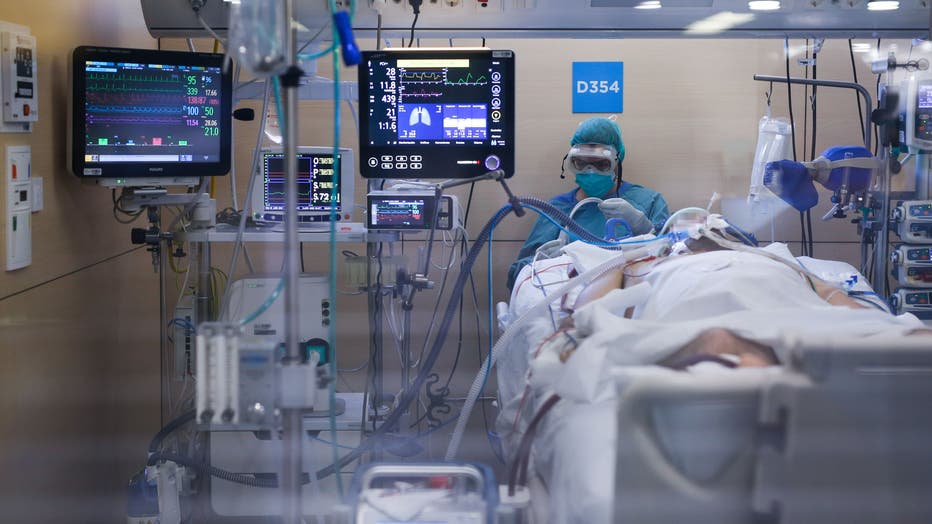Arizona hits record of 1,000-plus COVID-19 hospitalizations
Health workers applaud these seniors defeated COVID-19
Across the world, health workers are applauding older individuals who've recovered from the novel coronavirus.
PHOENIX - The number of patients hospitalized with positive or suspected cases of COVID-19 in Arizona has reached an all-time high, according to state figures.
The state Department of Health Services says hospitals reported a total of 1,009 hospitalizations on Monday. It’s the first time the daily number has reached 1,000. The agency has been disclosing hospitalization data since April 9.
Health officials reported Tuesday an additional 1,127 COVID-19 cases as well as 24 deaths. Including those findings, the total number of cases in Arizona now stands at 21,250 and the number of deaths at 941.
The increases are being reported in the wake of more testing and of Gov. Doug Ducey’s lifting of some lockdown orders that closed many businesses and other establishments.
Ducey has said Arizona’s health care system can care for any coronavirus patients and has enough hospital beds and ventilators available.
Some of the known deaths have been reported only after health officials examined death certificates.
For most people, the new coronavirus causes mild or moderate symptoms, such as fever and cough that clear up in two to three weeks.
For some — especially older adults and people with existing health problems — it can cause more severe illness, including pneumonia and death.

TOPSHOT - A healthcare worker wearing a protective suit attends to a COVID-19 coronavirus patient at the Intensive Unit Care (ICU) of the Vall d'Hebron Hospital in Barcelona on April 6, 2020. - Spain declared a fourth consecutive drop in the number o
In order to protect yourself from a possible infection, the CDC recommends:
- Avoid close contact with people who are sick.
- Avoid touching your eyes, nose, and mouth.
- Stay home when you are sick.
- Cover your cough or sneeze with a tissue, then throw the tissue in the trash.
- Clean and disinfect frequently touched objects and surfaces using a regular household cleaning spray or wipe.
- Wash your hands often with soap and water for at least 20 seconds, especially after going to the bathroom; before eating; and after blowing your nose, coughing, or sneezing.
MAP: Worldwide interactive Coronavirus case data
MAP: Arizona Coronavirus cases by zip code
FULL COVERAGE: fox10phoenix.com/coronavirus
Coronavirus (COVID-19)
How it spreads, symptoms, prevention, treatment, FAQ
https://www.cdc.gov/coronavirus
Arizona COVID-19 Response
Public resources, FAQ, webinars
https://www.azdhs.gov/coronavirus
On CoronavirusNOW.com, you'll find extensive coverage about COVID-19, including breaking news from around the country, exclusive interviews with health officials, and informative content from a variety of public health resources.
RELATED:
- Coronavirus in Arizona: Latest case numbers
- Coronavirus: Symptoms, testing and how to prepare amid growing COVID-19 outbreak
- How coronavirus differs from flu: Symptoms to watch for
Symptoms for coronavirus COVID-19 include fever, coughing, and shortness of breath. These, of course, are similar to the common cold and flu.
Expect a common cold to start out with a sore or scratchy throat, cough, runny and/or stuffy nose. Flu symptoms are more intense and usually come on suddenly, and can include a high fever.
Symptoms of COVID-19 may appear more slowly. They usually include fever, a dry cough, and noticeable shortness of breath, according to the World Health Organization. A minority of cases develop pneumonia, and the disease is especially worrisome for the elderly and those with other medical problems such as high blood pressure, obesity, diabetes, or heart conditions.
RELATED: Is it the flu, a cold or COVID-19? Different viruses present similar symptoms
Right now there's one big difference between flu and coronavirus: A vaccine exists to help prevent the flu and it's not too late to get it. It won't protect you from catching the coronavirus, but may put you in a better position to fight it.
To protect yourself, wash your hands well and often, keep them away from your face, and avoid crowds and standing close to people.
And if you do find yourself showing any of these flu or coronavirus symptoms - don't go straight to your doctor's office. That just risks making more people sick, officials urge. Call ahead, and ask if you need to be seen and where.

